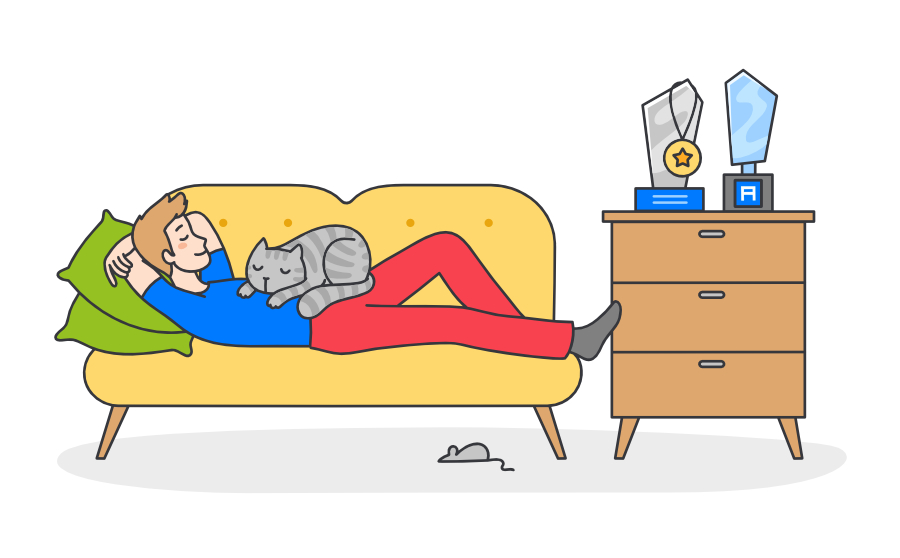Provide yourself time for recovery - this is the key to psychological stability

Can a simple substance like water tell us about psychological stability?
If you listen to Bruce Lee , it definitely can.
“Clear your mind, lose your form. Get shapeless like water. If you pour water into a cup, it becomes a cup. If you pour it into a bottle, it becomes a bottle. In a teapot, she becomes a teapot. Water can flow, but it can also crush. Be water, my friend. "
It is natural for us to try to control what surrounds us. But Bruce Lee - a famous martial artist, movie star and cultural icon - understood that great power was hidden in mastering the art of detachment.
In many ways, Lee’s philosophy is associated not so much with “hardening,” as with balancing one’s own energy — to show flexibility, rather than an indestructible will. And such a view is easily applicable to our desire to recycle.
Startups often praise energetic round-the-clock activities , but this is the problem: one of the biggest misconceptions about psychological stability at work is that we think that we should work harder, although in reality we need to take time to fully recover.
Translated to Alconost

Originally posted on JOTFORM.COM
Why does the brain need rest
The article by Michelle Gilan and Sean Achor of the Harvard Business Review illustrates why, in order to survive and not go crazy, we need to stop working tirelessly. They write:
“We often adhere to a militaristic,“ tough ”approach to the formation of psychological stability and endurance. We imagine how a commando squeezes through the mud, how a boxer goes on another round, or how a football player rises from the lawn to continue the game. We believe that the longer we stand, the more hardened we become, and the more successful we will be. ”
The authors also cite a 2010 study published in the journal Ergonomics , which shows the relationship between a lack of recovery and an increased likelihood of health problems such as fatigue and poor sleep.

It becomes obvious that workaholism harms us: if rest is not enough, even small problems can be exacerbated. One study found that overly hard work not only depletes mental and physical resources, but also reduces productivity.
In the early days of JotForm, I was so captivated by the idea of creating drag-and-drop web forms that from morning till night I just did what I worked, answering letters and calls to customer support. Then, in order to achieve the result, I had to constantly do something , even if it meant working 16 hours a day.
And although I recall this time with great tenderness, over the past thirteen years I realized that business development does not boil down to work hard. I believe that one of the reasons why I was able to attract five million users is that for me the time spent with benefit outside work was a measure of success , as well as the fact that the main principle of work in the company was the possibility of psychological recovery.
Remember: to raise a startup or business to its feet is to learn to balance between the desire to realize the plan and ensuring personal growth and well-being.
Be like water
The point of psychological stability is to adapt and respond positively to stress and adversity. Many of the brightest ideas come not through force, but because we give them the opportunity to flow freely. Bruce Lee said :
“Be like water breaking through cracks. No need to be assertive - adjust to the object, and you will find a way around it or go through it. If nothing solid remains inside you, the outside world will reveal itself. ”
Try to remember the last time you felt a real surge of energy after a break. After all, you probably spent the time allotted for rest, analyzing e-mail, or trying to solve some problems at dinner?
Many entrepreneurs forget that the concept of “free time” means the time when you need to free yourself from worries and return to other areas of life. Moreover, it is not enough just not to do something specific - it is also necessary to give the mind a break from thinking about it.
Gilan and Achor note:
“If you lie in bed for eight hours, you can relax, but the next day you feel exhausted - because rest and recovery are not the same thing. Doing nothing means recovering. ”
With those for whom restoring strength is a difficult task, I would like to share important, in my opinion, principles that will help me learn how to build in periods of rest on my day.
Ways to increase psychological stability

Strategic rest periods
You work for considerable periods of time and do not give the mind a break? Managing your own concentration and energy can be as simple as using the right tools, like setting up automatic break reminders or turning off your phone.
After 90 minutes, pause and leave the workplace. Do not bring your phone with you - chat with colleagues or go for a walk. Brad Shtulberg and Steve Magness write about this: stress + rest = growth.
“It may take courage to do this, but real magic is hidden here. It may seem paradoxical, but after a certain moment, the main factor for improvement is not hard work, but rest. Only when we rest - and best of all it happens during sleep - do our body and brain recover and become stronger. ”
Avoid over planning
Nothing causes fatigue faster than filling all your free time with some activity. Excessive planning may make you feel like you are standing on the endless treadmill of meetings and business dinners.
One of the best ways to avoid this trap is to prioritize and set aside unconditional personal time. Thus, even if all day is busy with current affairs, you will have time to recover.
Allow yourself time to recover
You planned a vacation time - great. The point is small: learn to sacredly honor your right to this time. You will not plan any activity for the time of an important meeting with the client - this also applies to free time.
Remember: increasing psychological stability begins with the fact that you postpone cognitive activities and allow the batteries to fully charge.
To find the right balance between work and recovery means to adapt to the situation and master the art of detachment, learn to be like water.
About the translator
The article was translated by Alconost.
Alconost localizes games , applications and sites in 70 languages. Native translators, linguistic testing, cloud platform with API, continuous localization, project managers 24/7, any format of string resources.
We also make advertising and educational videos - for sites that sell, image, advertising, educational, teasers, expliner, trailers for Google Play and the App Store.
→ Read more
All Articles